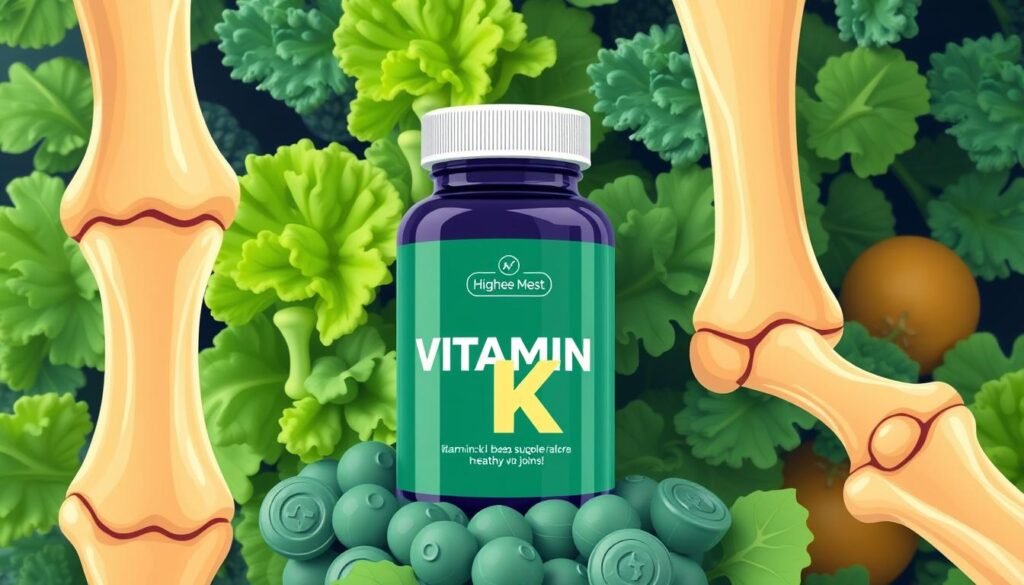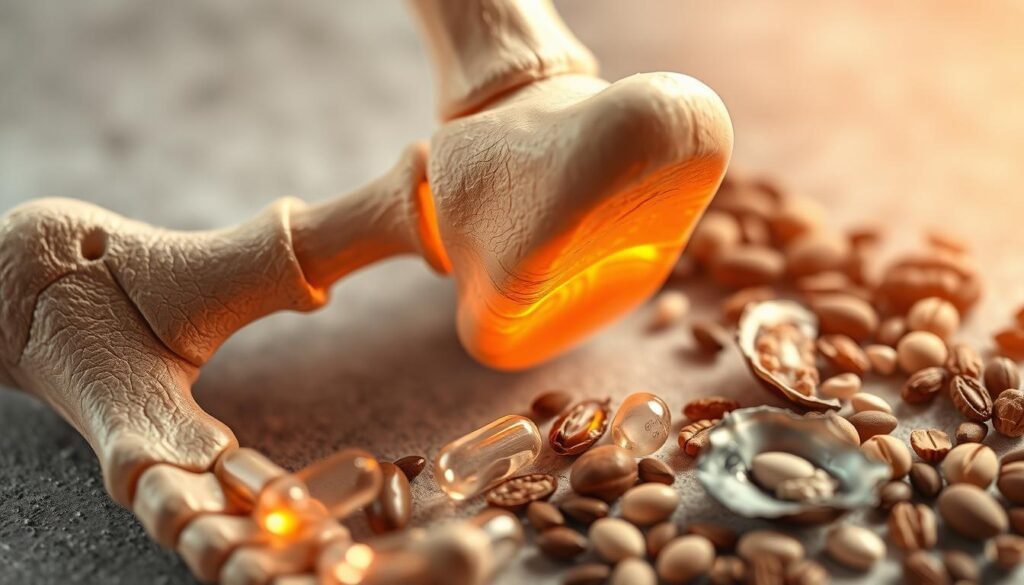Ever wonder why some older people still have strong bones and others don’t? It’s key to know which vitamins help prevent conditions like osteoporosis. These vitamins are super important for keeping bones dense and healthy. They are not just simple buzzwords. Research shows we need them to avoid bone problems. This piece will tell you about essential vitamins like vitamin D and how they help bones stay strong.
Key Takeaways
- Essential vitamins are crucial for maintaining strong, healthy bones.
- Vitamin D significantly aids in calcium absorption, vital for bone strength.
- Adequate vitamin intake can help prevent osteoporosis and other bone diseases.
- Understanding sources of essential vitamins can guide better dietary choices.
- Bone health supplements can be beneficial, but natural food sources should be prioritized.
- Regular intake of vitamins contributes to overall well-being and longevity.
Introduction to Bone Health
Bone health is key to overall well-being and staying active. Strong bones hold us up and protect our organs. They also prevent fractures and keep us stable.
Eating right plays a big part in having strong bones. Calcium and vitamin D are especially important for bone strength. Exercise, like walking or lifting weights, helps too. And, it’s wise to drink less alcohol and avoid smoking for your bones’ sake.
The Importance of Essential Vitamins for Bone Health
Knowing how essential vitamins help our bones is key to keeping them strong and healthy. Our bones are mainly built from calcium and phosphorus. These minerals work together, making our bones strong and flexible. Various vitamins in our foods play a big part in this process.
Understanding Bone Structure and Function
Bones are always changing and renewing themselves. Besides supporting our body, they protect organs and help us move. Vitamins D, K, and C work with minerals like calcium to keep bones healthy. It’s important to look at how all these nutrients work together for bone health.
How Vitamins Influence Bone Health
Vitamins do more than just feed our bones. They make them denser and help them grow and heal. Vitamin D, for example, helps our body use calcium better. And vitamin K is important for making bone protein. Not having enough of these vitamins can make bones weaker and more likely to break. Studies show eating right and staying active can make bones stronger. This shows how vital vitamins are for healthy bones. To learn more, check out this study.
Key Vitamins for Bone Strength
Strong bones need different vitamins that work together. Each one adds something special to bone health. They help keep the skeleton strong and whole.
Vitamin D is super important for bone strength. It helps our bodies use calcium properly. Without enough vitamin D, our bones can’t get strong from calcium alone.
Vitamin K helps make proteins for building bones. It makes our bones tough and less likely to break. This nutrient is key for a sturdy skeleton.
Vitamin C is a must for making collagen. Collagen is like a frame for our bones. Getting enough vitamin C helps keep our bones in good shape.
B vitamins support our overall health, including our bones. They help keep our body’s systems running well. This helps our bones stay strong indirectly.
Vitamin D: The Sunshine Vitamin
Vitamin D is key for strong bones. It helps the body absorb calcium, essential for bone health. Without enough vitamin D, absorbing calcium becomes hard.
Role of Vitamin D in Calcium Absorption
Vitamin D and calcium work together for bone health. With enough vitamin D, our bodies can absorb calcium from foods better. This keeps bones strong. Not having enough vitamin D leads to weaker bones and a higher fracture risk.
Getting Enough Vitamin D Naturally
For strong bones, getting enough vitamin D is crucial. You can get it from:
- Sunlight exposure: Being outside lets your body make vitamin D.
- Fatty fish: Fish like salmon and mackerel are rich in vitamin D.
- Fortified foods: Some dairy products and cereals have added vitamin D.
Choosing these vitamin D sources helps with calcium absorption and bone health.

Calcium: The Foundation of Bone Health
Calcium is the main mineral that helps keep bones strong and healthy. It supports bone growth and maintains bone strength at all ages. Everyone needs to eat enough calcium-rich foods to help their bones stay strong.
Without enough calcium, our bones can get weak. This increases our chances of breaking a bone or getting osteoporosis.
Sources of Calcium in Diet
It’s easy to include calcium in your diet with many food options. Some top sources of dietary calcium are:
- Dairy products such as milk, cheese, and yogurt
- Leafy green vegetables like kale and broccoli
- Fortified foods, including certain cereals and plant-based milk
- Nuts and seeds, especially almonds and chia seeds
- Fish with edible bones, such as sardines and canned salmon
Understanding Calcium Supplements for Bones
Calcium supplements are an option for those who can’t get enough calcium from food. These supplements come in forms like calcium carbonate and calcium citrate. It’s important to understand how they work and what the right dose is.
Before taking supplements, here are some tips:
- Choose the right type of supplement for your diet.
- Get advice from a healthcare provider.
- Avoid taking too much to keep calcium levels healthy.
Eating a variety of calcium-rich foods and using supplements when needed can help. This ensures we get enough calcium for strong bones throughout life.
Vitamin K and Its Role in Bone Strength
Vitamin K is crucial for bone health. It impacts bone metabolism. Vitamin K also aids in forming proteins that regulate bone mineralization.
One benefit of vitamin K is better calcium absorption in bones. This boosts overall bone strength.
Studies link enough vitamin K to higher bone density. People who consume more of this vitamin have stronger bones and less fracture risk. Green vegetables like spinach, kale, and broccoli are great sources. Eating these foods daily helps maintain the right vitamin K level.

Below, find a comparison of vitamin K sources and how much they contain:
| Food Source | Vitamin K Content (µg per 100g) |
|---|---|
| Kale | 817 |
| Spinach | 483 |
| Broccoli | 141 |
| Green Lettuce | 126 |
| Brussels Sprouts | 177 |
To sum up, vitamin K is crucial for bone health improvement. Many benefits of vitamin K show its key role in strong bones.
Magnesium for Bone Health
Magnesium is crucial for bone health. It helps turn vitamin D into its active form, aiding calcium absorption. It’s key for strong bones and lowers osteoporosis risks.
The Importance of Magnesium in Bone Formation
Studies show magnesium’s role in bones. It keeps bone density normal. Low magnesium can increase fracture risks. Many people get less magnesium than they need, hurting bone health.
For strong bones, eat magnesium-rich foods. Great sources are:
- Nuts
- Seeds
- Whole grains
- Dark leafy greens
Eating these helps meet magnesium needs. If you can’t get enough from food, think about supplements. Good magnesium levels are key for bone density and fighting osteoporosis. Learn more at this resource.
| Food Source | Magnesium Content (mg per serving) |
|---|---|
| Almonds (1 oz) | 76 |
| Spinach (cooked, 1 cup) | 157 |
| Black Beans (1 cup) | 60 |
| Whole Wheat Bread (1 slice) | 23 |
In summary, magnesium is key for strong bones and fewer fractures. We mustn’t ignore this mineral. Make sure you get enough through your diet or supplements.
Zinc and Bone Density
Zinc is key for healthy bones. It’s a must for anyone worried about their bone density. This mineral helps with cell metabolism and bone tissue formation. Getting enough zinc is important for maintaining bone density and making bones stronger.
Zinc’s role in bone health is big. It boosts osteoblasts, the bone-forming cells. With enough zinc, these cells work better, improving bone density. If you don’t get enough, your bones might not be as strong.
To get enough zinc, eating a range of foods is important. Foods rich in zinc include:
- Meat (beef, pork, and lamb)
- Shellfish (oysters, crabs, and lobsters)
- Legumes (chickpeas, lentils, and beans)
- Nuts (cashews, almonds, and peanuts)
- Seeds (pumpkin and sesame seeds)
For good bone density, it’s smart to choose your food carefully. Eating these foods regularly is good for your bones.

| Food Source | Zinc Content (mg per serving) | Bone Health Benefit |
|---|---|---|
| Beef (3 oz) | 7 | Supports osteoblast function |
| Oysters (6 medium) | 32 | Enhances cellular metabolism |
| Beans (1 cup) | 2.9 | Provides essential minerals for bone repair |
| Almonds (1 oz) | 1.1 | Contributes to overall nutrient intake |
| Pumpkin seeds (1 oz) | 2.2 | Strengthens immune response |
Vitamin C’s Contribution to Bone Health
Vitamin C is crucial for strong, healthy bones. It helps make collagen, which is a big part of your bones. Enough Vitamin C improves bone health and aids in healing.
How Vitamin C Affects Collagen Production
Collagen is the main protein in bones, giving them support and flexibility. Vitamin C boosts collagen production, crucial for bone growth. It also helps the cells that create bones.
To get enough vitamin C, add citrus fruits, strawberries, and bell peppers to your meals. These foods are packed with vitamin C. They keep collagen production strong for better bone health.
| Vitamin C Sources | Vitamin C Content (per 100g) |
|---|---|
| Citrus Fruits (Oranges) | 53.2 mg |
| Strawberries | 58.8 mg |
| Bell Peppers (Red) | 80.7 mg |
| Kiwifruit | 92.7 mg |
Adding vitamin C to your daily diet is key for bone health. It promotes collagen production and keeps bones strong and dense.
Conclusion
The talk about important vitamins for bones shows they are key for keeping bones and joints strong. Vitamins like D, calcium, and K are crucial for bone density and strength. Minerals like magnesium and zinc also play a big role in bone health.
To keep bones healthy, aim for a diet full of these needed vitamins and nutrients. Adding foods rich in these is important. Yet, don’t ignore the help supplements can offer if your diet isn’t enough. A detailed guide on bone health vitamins can help check your eating habits.
It’s wise to carefully look at what you eat for your bones’ sake. Being mindful about your diet can improve your bone health and prevent future problems. By focusing on these vitamins, you can really improve how you live.